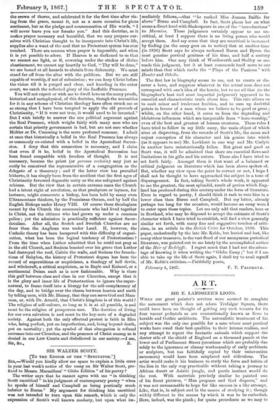SIR WALTER SCOTT.
[To THE EDITOR OF THE "SPECTATOR."] SIR,—Would you kindly allow me space to explain a little error in your last week's notice of the essay on Sir Walter Scott, pre- fixed to Messrs. Macmillans' "Globe Edition" of his poetry?
The writer says that he cannot agree with me "in thinking Scott uncritical" in his judgment of contemporary poetry "when he speaks of himself and Campbell as being poetically much inferior to Burns." My argument for thinking him uncritical was not intended to turn upon this rethark, which is only the expression of Scott's well known modesty, but upon what im-
mediately follows,—that "he ranked Miss Joanna Baillie far above" Burns and Campbell. In fact, Scott places her on what seems a direct level with Shakespeare in one of the "introductions" to Marmion. These judgments certainly appear to me un- critical, at least I suppose there is no living person who would accept them. And my sense that they are uncritical is increased by finding (as the essay goes on to notice) that at another time (in 1826) Scott says he always reckoned Burns and Byron the most genuine poetical geniuses of his time, and half a century before him. One may think of Wordsworth and Shelley as one reads this judgment, but it at least commends itself more to our minds than that which ranks the "Plays of the Passions" with Hamlet and Othello.
The first law in biography seems to me, not to create or dis- cover a hero, and suppress whatever in the actual man does not correspond with one's idea of the heroic, but to see all that (to the biographer's best and most impartial judgment) appeared to be essential and characteristic truth about him. This rule allows us to omit minor and irrelevant frailties, and to sum up doubtful points in favour of a man whom we believe to be good or great ; whilst, on the other hand, it saves us from the degrading and idolatrous influences which are inseparable from "hero-worship," even of the best and greatest of human creatures. These rules I have tried to follow in my little essay, the main object of which aims at disproving, from the records of Scott's life, the mean and unjust conception of his character and his genius into which (as it appears to me) Mr. Lockhart in one way and Mr. Carlyle in another have unintentionally fallen. But great and good as Scott was, it will be admitted that there are essential flaws and limitations in his gifts and his nature. These also I have tried to set forth fairly. Amongst them is that want of a balanced or critical judgment on literature which has been above spoken of. But, whether my view upon the point be correct or not, I hope I shall not be thought to have approached the subject in a tone of disparagement. In fact, taking Scott's whole work, it appeared to me the greatest, the most splendid, result of genius which Eng- land has produced during this century under the form of literature. Even in regard to poetry, I should think it rash to rate him in a lower class than Burns and Campbell. But my letter, already perhaps too long for the occasion, would become an essay were I to enter upon these topics. Let me only add that readers, here or in Scotland, who may be disposed to accept the estimate of Scott's character which I have tried to establish, will find a view generally similar set forth, with many fine and suggestive touches of criti- cism, in an article in the British Critic for October, 1838. This paper, undoubtedly by the late Mr. Keble, but buried and lost, like many other treasures, in the vast flood of our anonymous periodical literature, was pointed out to me lately by the accomplished author of the Heir of Redclyffe. I regret much that I had not the advan- tage of knowing it when writing the "Globe Essay ;" but if I am able to take up the life of Scott again, I shall try to avail myself of Mr. Keble's criticism.—Faithfully yours,






























 Previous page
Previous page